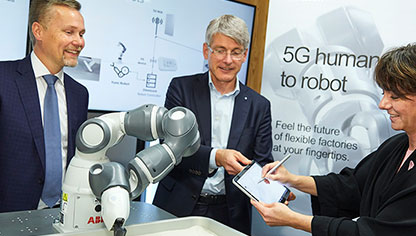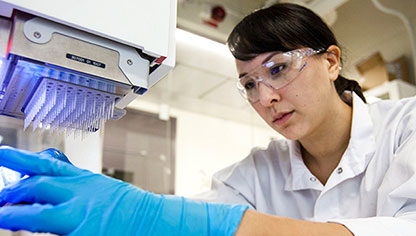National strategic research areas
KTH has a leading role in five national strategic research areas: IT and mobile communication, molecular biosciences, transport, production, and e-science. The investment towards strategic research areas started in 2009 and was made on behalf of the Swedish government.
In 2009, the government decided to invest in SRA's, and the decision aimed at creating the best conditions for the generation of world-leading research. It was based on the recommendation of the Swedish Research Council, FAS, Formas, Vinnova, and the Swedish Energy Agency.
National research areas coordinated by KTH
KTH coordinates the following five areas:
- e-Science
- IT and mobile communication technology
- Molecular life sciences
- Production
- Transport
Swedish e-Science Research Centre (SeRC)
Digital futures: Information and Communication Technology the Next Generation (ICT-TNG)
SciLifeLab: Science for Life Laboratory
Excellence in Production RESearch (XPreS)
Transport Research Environment with Novel Perspectives (TrENoP)
Research areas where KTH is partner
KTH is partner in five strategic research areas:
StratNeuro
Area: Brain
Brain disorders are among the most common causes of disability in high-income countries. The European Brain Council has estimated that one-third of Europe's residents will be affected at some point during their lifetime. StratNeuro integrates research in clinical and basic neurosciences, aiming to reduce the burden of disease from brain disorders.
Coordinator: Karolinska Institutet.
U-CAN
Area: Cancer
The research community U-CAN collects and structures data, biomolecules, tumor, and blood samples from cancer patients before, during, and after treatment. The material is used to develop methods and drugs for diagnosing and treating tumor diseases.
Coordinator: Uppsala University.
ModElling the Regional and Global Earth system (MERGE)
Area: Climate changes
Even though we already have sufficient knowledge of climate change today to justify emission reduction actions, there is still a need to understand better the uncertainties that remain in assessing climate change and its consequences
Coordinator: Lund University.
Stand-Up for Energy (StandUP)
Area: Energy
STand-UP focuses on long-term sustainable energy supply, one of the grand global challenges in the coming decades. The research groups within STand-UP have a shared vision for the future of society with access to renewable, reliable, and cost-effective energy for housing, trade, transport, and industry.
Coordinator: Uppsala University.
Security Link
Area: Security and Emergency preparedness
Security and emergency preparedness cover wireless communication, advanced sensors and detectors, sensor and information fusion, decision support and coordination for crisis management, and related ethical issues.
Coordinator: Linköping University.





